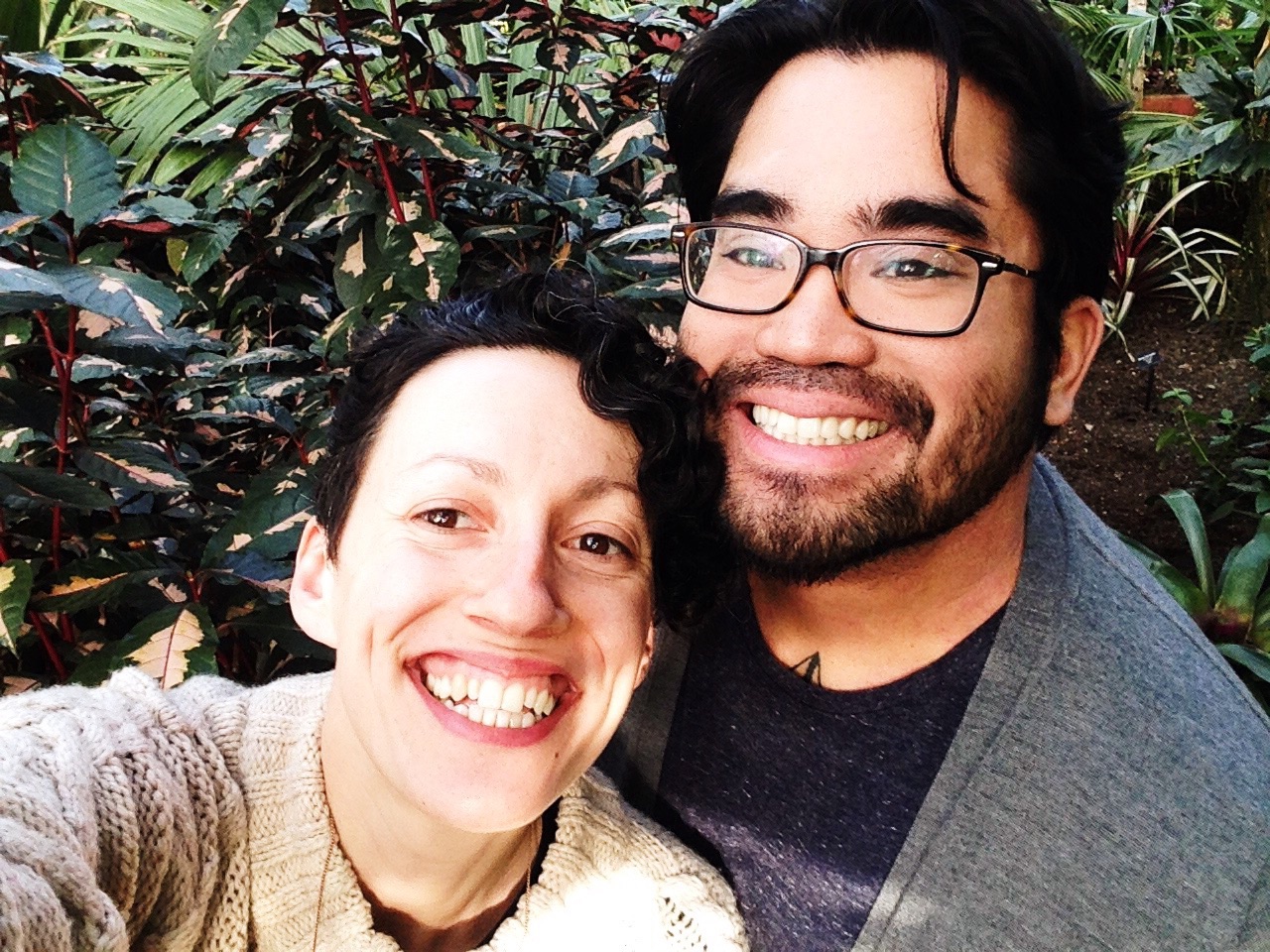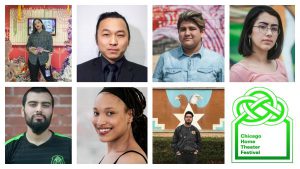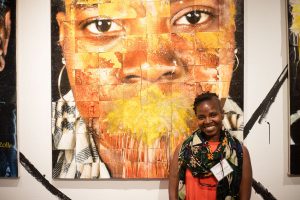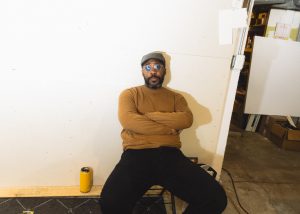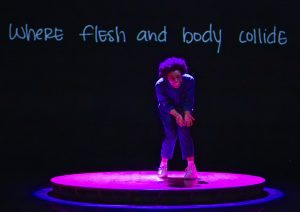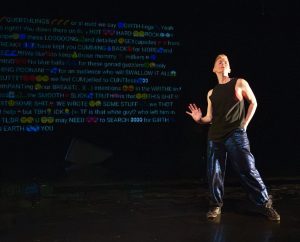This interview is a collaboration between Sixty and Chicago Home Theater Festival, a festival that invites strangers into each other’s homes to share a communal meal, experience transformative art, and build intentional community across lines of difference. CHTF centers the leadership of women and femmes, artists of color, immigrants and refugees, LGBTQ folks, and artists with disabilities whose creative practice disrupts injustice and paves cultural safe passages across our hyper-segregated city.
Festival co-founder, executive producer, and host Irina Zadov is a socially-engaged artist, educator, and cultural organizer. Born in Belarus, in the former Soviet Union, her practice explores home, place, and the relationship between the domestic and the public, the intimate and the political. Michael Aguhar is a community organizer working for immigration and worker rights within the Filipino community here in Chicago. They’re hosting a night in their home to close out the festival on May 29th. Be sure to get your tickets.
Haydée Souffrant: Hello Irina and Michael! So, to start us off, can you tell me where do you live?
Michael Aguilar: We live in Edgewater.
Irina Zadov: You should tell her the story of the apartment.
MA: Right. We actually live in the same apartment that I took my first steps and grew up in here in Chicago. I remember one of my first memories was walking around and apparently, I would call the operator. My mother and aunt (both from the Philippines), bought this condo. We’ve had a complicated history with this place, I mean- it’s strange to have such a deep history with this place that’s involved a lot of trauma, but good memories as well.
HS: WOW. It must be such an experience to live in the space that informed and shaped you.
MA: It has. I mean, I couldn’t imagine living anywhere else. Like when I was moving or looking for places to live, I kept thinking, “but I don’t want to live in Logan Square or Lakeview.”
(Laughter)
HS: So Irina, you mentioned you’re from the East Bay (San Francisco), so what brought you to Chicago?
IZ: So, I’m originally from Belarus, and my family immigrated to Los Angeles in 1991 as a little child, about 7. It was during the Rodney King riots and the earthquakes. And then my parents couldn’t find work, so all of those factors led to my parents moving east to Denver, CO, where I grew up in the suburbs. It was very homogenous, so no one ever met an immigrant before me. After college there, I did my masters at SAIC in 2005. I moved back to California for a few years, then spent some time in Belarus doing some socially engaged work, and after coming back and moving to the South Side, Michael and I met about a year ago while he was looking for a new place and so I’ve technically only been in Edgewater for about six months.
HS: So between the two of you, having such nuanced ideas and understandings of home, what’s stayed the same about the Edgewater neighborhood?
MA: Let’s see. I think the diversity in Edgewater has stayed the same, and that’s something that I love about it. I mean, even the diversity in this [condo] building alone and the previous building I was in down the street is something that I appreciate. Immigrants families, families that have been here for a long time, inter-generationally, and have seen Edgewater grow and change is something that’s been a big appeal to me.
IZ: For me it’s the more North Side/South Side ties-
(Laughter)
IZ: It’s easy to get territorial even though I’m not from Chicago. It was a big shift for me to come to the North Side. But what’s funny to me is that my sense of this neighborhood is rooted in this building. I work for the Chicago Park District so I work all over the city, but this building for me really shows me what Edgewater looks like and feels like. I love being able to ride up and down the elevator and see different languages from all over the world. Even my ideas of moving into a condo shifted because of the diversity in culture and income within this building.
HS: What’s changed?
MA: I think… a lot of the affordable housing units and mental health facilities have started to disappear which is frustrating. There’s a lot more proliferation of luxury living and commercial buildings that are coming in.
IZ: Right. And as an immigrant, I also see a lot of the forcing out of immigrants in the community for these luxury homes—and granted there’s a privilege in living in a condo—but watching a lot of my generation come back and push out low income, immigrant and people of color out of urban areas is hard. And happens in every major city in this country.
HS: And in every neighborhood of Chicago.
IZ: Exactly. Reverse white flight. So it makes me commit to how we can work to retain the diversity in neighborhoods like this.
HS: Okay. So we’ve covered immigrant flight, luxury housing coming in, and diversity. (Chuckles). This makes me think of home place and what it means to find or be at home. Can you think of a time that you felt at home in here in Edgewater?
MA: I think it was when I was looking for places. I think it was when I started to have more physical walking relationship with the neighborhood, and a sense of familiarity. As in recognizing people, not just in my building but in my area. Even if I was in the downtown area, and seeing Edgewater folks. Yeah, I think that was the moment for me. Oh, and understanding the issues that are faced in the community. Like Senn High School, or police accountability. Or, who the neighborhood changes really impacts.
IZ: Same. With taking a lot of walks in the neighborhood, it’s amazing the things we both notice. Honest, I think about who some of the homes were built by, and how local businesses have stayed. I ask a lot of questions- and I’ve moved around my whole live. I feel like this is the place [Chicago] where my people are at, because I care about a lot of different communities.
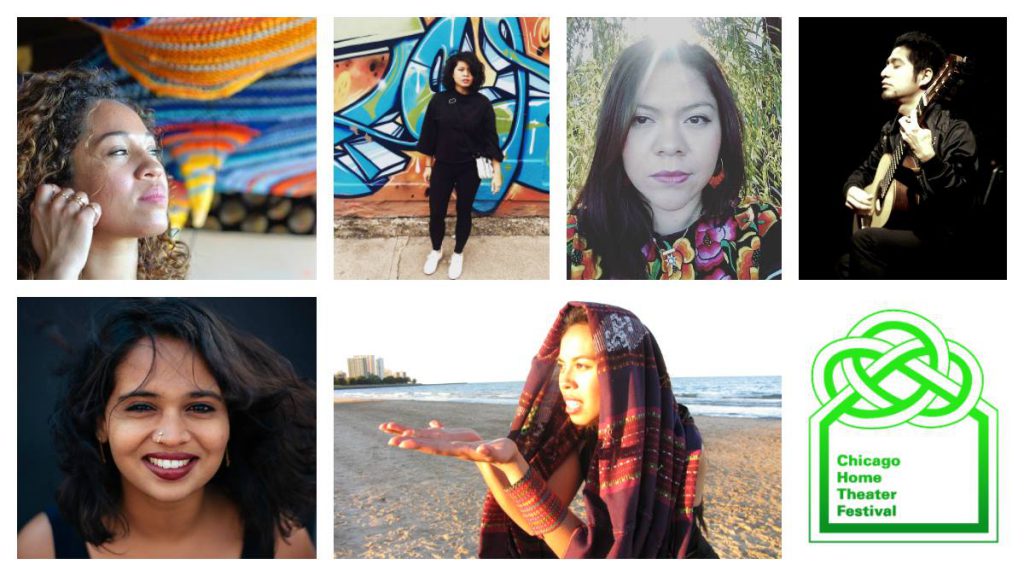
HS: So is it too far of a stretch to say that…it’s really the communities that you work with and take part of that are you home as opposed to a physical place?
IZ: No that’s completely fair. Being part of a global diaspora and knowing that it’s by chance that I’m in this part of the hemisphere and know that the actual land I was born doesn’t consider me a citizen or member of their tribe, I’m grateful to be apart of the Chicago community.
HS: I see. So because both of you have such rich histories around identity and migration, how do you feel when people ask you “where you’re from”?
MA: I was thinking about this actually. I always say I’m from Texas. And then if they keep pressing I say my family is from the Philippines. There’s a cultural reinforcement of Texas culture and that’s influenced me a lot.
IZ: It’s been interesting. That was the first thing people would ask me as a child immigrant. And after assimilating and living here for 20 years losing my accent and then now no one really asks me that. It’s funny because some of my family will say they’re from Russia but I always go ‘but wait no you aren’t” (laughs). There are levels of identity. I think now when I pronounce my name Irina (EE-ree-nah), that’s when people ask me about my roots. I do find that I acknowledge that I’m from Chicago when I’m not in Chicago.
HS: Are there particular things that you think people should know about Edgewater? There are a few housing units that cater to tenants that utilize mental health serves that I don’t think gets highlighted. And the seniors in the communities have such history because a lot of them have grown and stated in the Edgewater community.
IZ: I also think that Edgewater along with Albany Park and a few other neighborhoods here in the city have the largest refugee populations and how focal community building is. There’s the spectrum of life ere that unfortunately is getting displaced by capital.
MA: Also how vibrant the queer communities in Edgewater are.
HS: So true. What’s a person or place that is quintessential to this community?
MA: Hmmm. I think my cousin who’s lived in Edgewater her whole life, and now with her family. I can’t really imagine Edgewater with her. Probably Alderman Osterman’s mother, Kathy Osterman who was also alderman. She did a lot of work around the Chicago Human Rights Act and supporting the Broadway Armory along with the LGBTQ community here in Edgewater. And the beaches here- mainly Hollywood and Montrose Beach.
Featured image: Irina Zadov and Michael Aguilar, courtesy of the hosts.
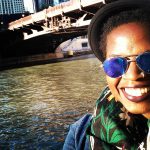 Haydée Souffrant is a Chicago-based multimedia artist crafting work through storytelling, lyrical text, movement and visual/performance art to document the legacies of trauma one inherits throughout cultural, familial, and societal generations. Bridging together narratives of mental health + wellness within black and brown communities, Haydée’s work seeks to stimulate conversations on how do communities maintain survival in sharing stories of struggle and resistance alongside alternative healing practices. Studying West African dance forms with the Dance Diaspora Dance Theater Ensemble of Oberlin College, Haydée’s literary and visual work has been featured in numerous online literary publications, Oberlin College, The Whitney Museum, Links Hall and other venues in and around Chicagoland. Haydée is a graduate of Oberlin College, and a MFA candidate in the Interdisciplinary Arts + Media program at Columbia College Chicago with her work focusing on the intersections of storytelling, mental health, legacies of trauma + healing across communities of color. Also a Reiki practitioner and founder of The Rooted Turtle Healing, as you can tell, she loves turtles and writing things.
Haydée Souffrant is a Chicago-based multimedia artist crafting work through storytelling, lyrical text, movement and visual/performance art to document the legacies of trauma one inherits throughout cultural, familial, and societal generations. Bridging together narratives of mental health + wellness within black and brown communities, Haydée’s work seeks to stimulate conversations on how do communities maintain survival in sharing stories of struggle and resistance alongside alternative healing practices. Studying West African dance forms with the Dance Diaspora Dance Theater Ensemble of Oberlin College, Haydée’s literary and visual work has been featured in numerous online literary publications, Oberlin College, The Whitney Museum, Links Hall and other venues in and around Chicagoland. Haydée is a graduate of Oberlin College, and a MFA candidate in the Interdisciplinary Arts + Media program at Columbia College Chicago with her work focusing on the intersections of storytelling, mental health, legacies of trauma + healing across communities of color. Also a Reiki practitioner and founder of The Rooted Turtle Healing, as you can tell, she loves turtles and writing things.
